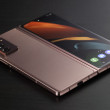MFBI
Multiple Frequency Band Indicator
A feature of some newer (2015 and on) networks and phones that enables interoperability between phones and networks that are designed for overlapping frequency band definitions.
Before MFBI, a cellular base station (a "tower") operating at a given radio frequency could only "advertise" to phones that it supported one band definition, even if its frequency fell within two overlapping band definitions. This relatively small technical issue was a large barrier to phone/network compatibility.
For example, U.S. Cellular owns licenses for its LTE network to broadcast at 728-734 MHz. The only band definition that covers that range is "band 12", which covers 728-746 MHz. So the U.S. Cellular network and phones are designed for band 12. Meanwhile, AT&T operates part of its LTE network broadcasting at 734-746 MHz. Band 12 covers those frequencies, but so does band 17, which is defined as just 734-746 MHz, a subset of band 12. AT&T originally designed its network and phones to operate only as band 17. This meant that U.S. Cellular's band 12 phones could not connect to AT&T's band 17 network, even though both were otherwise perfectly capable of communicating at 734-746 MHz. MFBI allows AT&T's network to advertise to phones that it is both band 12 and 17. This relatively simple change allows band 12 phones to connect to AT&T's network.
Similar issues affect other frequency bands and other companies' networks, including T-Mobile and Sprint.
MFBI is a relatively new feature, introduced in 2015. Networks must be upgraded to support it. Phones must also specifically support MFBI to take advantage of it; older phones do not support it.
Last updated Apr 10, 2015 by Rich Brome
Editor in Chief Rich became fascinated with cell phones in 1999, creating mobile web sites for phones with tiny black-and-white displays and obsessing over new phone models. Realizing a need for better info about phones, he started Phone Scoop in 2001, and has been helming the site ever since. Rich has spent two decades researching and covering every detail of the phone industry, traveling the world to tour factories, interview CEOs, and get every last spec and photo Phone Scoop readers have come to expect. As an industry veteran, Rich is a respected voice on phone technology of the past, present, and future.



